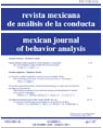Language as mediator of function transfer. ¿Its naming necessary for relational responding
Main Article Content
Abstract
With the purpose of evaluating the role of verbal behavior on the acquisition of derived stimulus relations two experiments were conducted. Experiments 1 and 2 examined performances in equivalence tests when participants were exposed to verbal interference tasks of different degrees of complexity during training trials. Experiment 1 and 2 differ in the training procedures used to produce derived relational responding. While in Experiment 1 participants were exposed to two types of respondent procedures, in Experiment 2 participants were exposed to the standard operant matching to sample procedure. Findings suggest that derived relational responding is observed even though verbal behavior with respect to the experimental task was impeded. In Experiment 1, all participants responded above criterion (75% correct responses) in at least one of the tests for derived relations. In Experiment 2, results show higher performances in symmetry than in transitivity and equivalence tests, independently of the type of interference task used during training. Neither the presence/absence of an interference task, or it’s the degree of complexity, appeared to have an effect on the emergence of equivalence relations. The implications of the present findings on naming accounts of equivalence relations are discussed.
